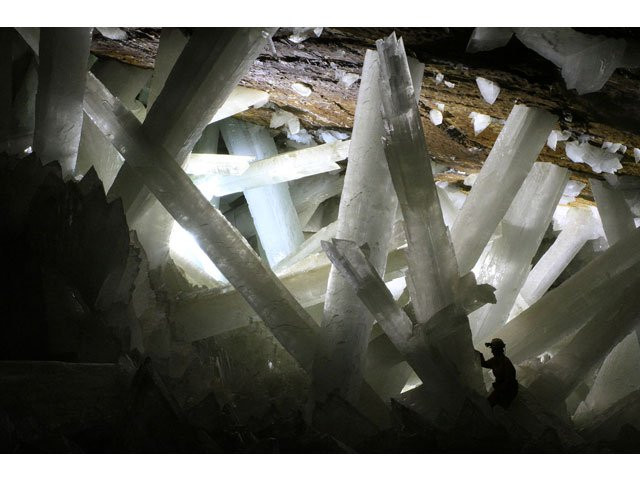Khushab’s gypsum deposits: a great opportunity for exporters
District holds treasure trove of the high-demand mineral in Kohistan Salt Mountain Range

Extensive reserves of gypsum are present in the Kohistan Salt Mountain Range in Khushab district in Sargodha.
According to experts, large deposits can prove to be a great opportunity for exporters if the government makes export agreements with countries other than the neighbouring states.
The government would also get a handsome revenue while mine owners and workers would benefit from the income.
Local labour leader Liaqat Hussain told The Express Tribune that gypsum was in high demand in neighbouring and Gulf countries. In 2017, India had a demand worth $100 million for gypsum, but only $14 million worth of the mineral, or 240,000 tonnes, f were exported, he stated.
Read more: The forgotten miners of Khushab
In addition to India, countries including Indonesia, the United States and Japan were the major importers of gypsum, he added. “Pakistan can reach agreements with these gypsum-importing countries and ensure export so that the people associated with this mineral and the country’s economy benefit the most.”
He further said that workers were the backbone of the country and special attention should be paid to their rights. “Their salaries should be paid in accordance with the law of the country. Most of the mine owners do not care about the rights of the workers and no safety measures have been taken for them. Strict action should be taken against such violators.”
Explaining the structure and benefits of gypsum, mining expert Farooq Malik said that gypsum was a mixture of water, calcium and sulfur. “Most perforated pieces are found in the form of fine particles or embossed earthen fragments. Gypsum is mixed with organic matter, sand and clay. Ground, rock gypsum is used as fertiliser.”
It is also known as ground plaster and is also used in glass as a disinfectant, he added. “The mineral is also used as decoration in cement and fertilisers. Most of the gypsum reserves are found in Dera Ghazi Khan district. These reserves are found in the form of cedar rocks in the low mountain range of Koh-e-Suleman.”
They are white and green in colour, the mining expert highlighted. “Gypsum reserves are also present in Khushab, Chakwal, Jhelum and Mianwali districts of Kohistan range. In Khushab district, gypsum is mostly sold in Quaidabad area. It is being used there to improve the land damaged by waterlogging and salinity.”
Abdul Karim, a local resident, said that the labourers and owners of the gypsum mines in Khushab district were very prosperous when they traded with the neighbouring countries. However, that is no longer the case. Despite this, hundreds of people involved in gypsum mining are benefiting economically.”
He further said that mine owners and contractors had started exploiting labourers in the hilly areas of Katha. “Neither the salary is paid according to the law nor are safety measures taken. At the same time, mine owners have started relying on machines instead of miners. Cranes and excavators are being used more and more due to which workers have become unemployed.”
At a place where 10 labourers used to work, now only two are being employed to do the job, he elaborated. “The mountains are also being damaged in the process.” He demanded the the government take steps to save these workers from losing their livelihood.
The In-charge of Mines Rescue Safety Station in Khushab Muhammad Kabir said that 16 mines of gypsum had been leased by Punjab government. “Gypsum is used in the construction of ceilings as well as in the production of cement and fertilisers. Mines in which any illegal activity is noted are closed.”
He further said that when a range was leased to a mine owner, he had the right to extract minerals through machinery or labourers.
He added that the salary of the workers had been fixed at Rs18,500 by the government. “Every mine owner is obliged to pay this compensation to the worker. If a worker dies due to an accident in a mine, the owner is obliged to pay Rs500,000. The government provides Rs600,000 to the family through the Workers Welfare Fund.”
A Mines Workers Hospital had been set up in Khushab, he stated. “Dispensaries have also been set up at various places. Medical facilities have been provided for the workers and their families. Scholarships are also provided for the children of labourers up to higher education.”
He highlighted that a marriage grant was also given. “Medical teams are always ready for emergency rescue in case of an accident in mines. An ambulance service is also available.”
Published in The Express Tribune, February 22nd, 2021.



















COMMENTS
Comments are moderated and generally will be posted if they are on-topic and not abusive.
For more information, please see our Comments FAQ